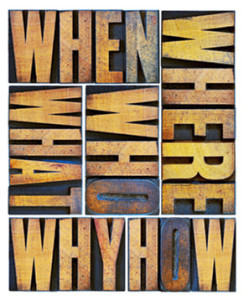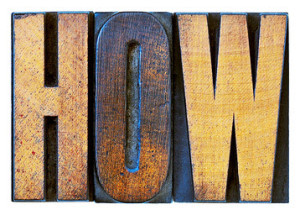Now? Later? Never? Are you waiting to make a pressing decision? What if the longer you wait, the more uneasy you feel? Worse — waiting too long becomes a non-decision decision, with concerning consequences of its own.
 Whether you’re waiting for input from others or your own light bulb moment, if the pieces aren’t falling into place, is just-in-time decision-making the best option?
Whether you’re waiting for input from others or your own light bulb moment, if the pieces aren’t falling into place, is just-in-time decision-making the best option?
Consider this observation:
If a decision does not make itself, I suspect that the timing isn’t right yet.
This is a remark offered by an astute reader as part of a conversation on relationships. It is decision-making advice I find useful to revisit, especially when timing appears to be critical to a venture’s success or failure.
Fear or Instinct?
And that venture?
It could be almost anything. Maybe it’s an investment. Maybe it’s starting your own business. Maybe it’s leaving a secure but unrewarding job. Maybe it’s a renovation, a relocation, a remarriage.
The stakes are high. The situation is complex. The impacts are potentially many, but the upside is a “win” that is very compelling.
Still, something is holding you back.
Is it reasonable caution, analysis paralysis, or outright fear? If an important decision doesn’t seem to make itself, if your ambivalence is winning the day, if your gut is telling you that you’re not ready — should you wait?
Is your internal GPS guiding you to choose the right path at the right time?
My understanding of just-in-time decision-making is this: executing significant decisions at the latest possible point in the process, and even in the midst of the process itself. Certainly, this makes sense in a business context — at times. Yet aren’t there occasions when the stakes are so high that it’s undeniably unwise? Is this always the case when talking about major life choices? Is “readiness” a matter of degree, itself a concept that is shifting and imprecise?
Jumping In, Stepping Out, Self-Limiting Self-Talk
Yours truly?
Before marriage and motherhood, when I wanted something, I jumped in with both feet. I wasn’t reckless, I did my homework first, but adventure came easily. I had a sense of my own capacity. Trying out a new country (for example) seemed like great fun, and even if it didn’t work out, I knew it would be an amazing experience. No doubt I was most cautious when it came to marriage.
And with that walk down the aisle and children, my priorities changed and likewise, decision-making. I was no longer making decisions alone, and all paths chosen impacted “the family.”
Fast forward to life after divorce and empty nest, and suddenly, all bets are off, and all doors and windows open — theoretically. Constraints pop up as well of course, and among them these:
- There is comfort in familiar routines and surroundings
- There is less “recovery time” in case of a mistake
- Health considerations may require accommodation
- Financial considerations are key
- It’s easy to sabotage dreams with “I can’t” instead of “I can”
That self-limiting self-talk?
There’s a difference between being practical and self-defeating. The former is necessary; the latter is toxic.
When You Know the What, But the How Is Challenging
Visualizing your goal? Knowing what “success” looks like? Identifying the “what” even if you don’t know the how?
I’ve always been good at identifying what I wanted and why. In my professional life, I’m adept at the “how” as well, and I consider myself a collaborative and creative problem-solver. However, color me confused at this new post-parenting stage, as I struggle with the “where” as part of the “how,” even as I’m focused on a definite “what.”
I know what I want my life to be; getting there, however, is another story.
Once upon a time, I was good at change. But isn’t that typically the case when we’re young? Isn’t that true when we’re light on baggage?
Some of us remain fans of change even as the years pass. We may plunge in, oblivious to consequences, or leap, knowing safeguards are in place to cushion any fall.
Or, we find that easing, inching, stepping, striding, marching, or diving into change is a function of our propensity for risk — and whether we’re talking about investing, entrepreneurship, relocation, or remarriage, we each bring to the table our certainties, our insecurities, hope for a bit of luck, and… our contingency plans.
This brings me back to the issue of timing, the inherent complexities of how, and the specifics of when.
Is Timing Everything?
Whatever the context, for some people, the “what” is the challenge. Once the what is clarified, the elements of “how” can pose overwhelming challenges. “How” is about acquiring or utilizing knowledge, skills, and abilities while marshaling resources as well as resolve, stamina, and capacity — in all the ways that word can be interpreted.
“How” is addressable with organization and planning.
In a project or business context, with time and experience, we master the tools we need. We understand how to:
- Position what we want as a “win” to key stakeholders
- Encourage participation and foster ownership by teams
- Negotiate and compromise where we must
- Develop backup plans, and more backup plans
- Make “agile” decisions in the heart of a business process itself
But on a personal level?
Accustomed though you are to decision-making with incomplete information on the job, it can be far much more frightening when it impacts your children, your home life, your sense of home. You may know the what, the why, the where… the “who” may be another person or it may well be about a better YOU — but the how, and especially the when, remains terribly daunting.
Age and Just-In-Time Decision-Making
Hello, Midlife?
With or without a crisis in the making, at a certain point we are aware of how precious our remaining time is. We want to fill our lives with meaning, purpose, love, love of life, aliveness.
When I consider just-in-time decision-making — the need to honor ambivalence until it dissipates — my thoughts on the matter shift when I factor in age.
At 55, don’t we look at time as a gift not to be squandered? Doesn’t waiting until “all the pieces fit” risk that we will waste opportunities out of fear?
Fear accompanies uncertainty. Confidence in our own judgment and abilities offers armament against that fear, diminishing the sense that we cannot manage whatever challenges lie ahead. Information helps; we may not have all that we might wish, but don’t we recognize when we have enough with which to make reasonable assumptions, create viable contingency plans, and make decisions to move us forward — or at least out of a rut?
If Not Now, When?
 Big decisions are always tough, even if the repercussions affect only ourselves — whether talking about taking a new career direction, leaving a long-term relationship behind, relocating to a new part of the country, entertaining the possibility that a new love relationship is just ahead.
Big decisions are always tough, even if the repercussions affect only ourselves — whether talking about taking a new career direction, leaving a long-term relationship behind, relocating to a new part of the country, entertaining the possibility that a new love relationship is just ahead.
My conclusion for myself is this: Not making a decision is a decision; not making a decision yet is a different, more active decision, if we are clear that this is what we are choosing. And, making a decision prematurely when your gut tells you you’re not ready isn’t smart.
Sometimes, someone else forces your hand. A boss, a lover, a spouse.
Events out of your control determine a new set of options — narrower in some ways, but potentially more expansive in others.
And in circling back to the notion of just-in-time decision-making, to the likelihood that it is a principle that relies on the underlying intelligence of the “gut,” a useful practice at times but not universally, we also know that when we wait too long to make a choice, our options change. This is as true of market opportunities as it is of personal ones.
And maybe, in pursuit of the prize — whatever it is — we ought not to back away from a hard decision, but rather, to face the fear.
And let the fear go.
And jump.
Possibly, just in time.
You May Also Enjoy

These are very complicated considerations. I especially relate to the the processes of decision-making that you describe:
“Not making a decision is a decision; not making a decision yet is a different, more active decision, if we are clear that this is what we are choosing. And, making a decision prematurely when your gut tells you you’re not ready isn’t smart.”
I’ve learned that I often regret decisions made before I am ready, even when my hand felt forced to decide. Now, I take that as a reason NOT to change. However, often my feelings aren’t the best indicator and I must look beyond the initial fear and challenge of change to the potential new status quo. Can I see how this would lead to what I want?
At some point, faith must enter. Faith in myself, the guidance and direction of a higher entity, my support systems and ability to rebound. For me, it will never feel good or safe to move into change, so I have to do so even when it feels challenging. Then, I must stop the wondering, stop the weighing and “what if-ing” and simply work the decisions that have been made.
Personally, I feel more capable of change now than in my younger years when I sought to control every outcome. Now I more readily accept what I can and cannot affect.
Best wishes in your own decision-making!
I have to say I analyze things to death. Then I make a decision. What drives me crazy is factors I cannot control or predict. Fear? No trepidation. My biggest regrets in life are things I have not done. Maybe that colours my views.